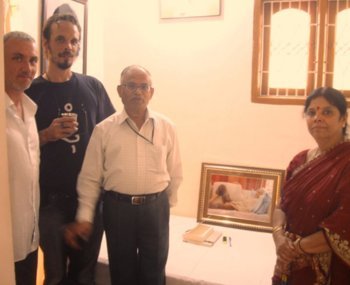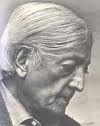 A no non-sense, and no serious Comic Epic on UG (a graphic novel) is coming out soon thanks to the crazy non-stop zeal and fantasy of the devil’s duo, Nicolas C Grey – a comic artist,and James Farley – a text-writer. They have been working on it since almost a year or so and it may hit the stands now any time, may be in a few months. Seriousness is a seed of cancer and somehow that is knowingly or unknowingly seeded in all our holy scriptures and teachings. Life is simply to laugh. But we carry life as a log of long dead wood. UG’s utterances or barkings are not to be put in another holy epic and hence the affront effort of Nicolas and James in presenting UG and his barkings in a bare but bold comic graphics is much appreciated and it is fittingly more appropriate as well. It’s a cosmic comic there, so to say.
A no non-sense, and no serious Comic Epic on UG (a graphic novel) is coming out soon thanks to the crazy non-stop zeal and fantasy of the devil’s duo, Nicolas C Grey – a comic artist,and James Farley – a text-writer. They have been working on it since almost a year or so and it may hit the stands now any time, may be in a few months. Seriousness is a seed of cancer and somehow that is knowingly or unknowingly seeded in all our holy scriptures and teachings. Life is simply to laugh. But we carry life as a log of long dead wood. UG’s utterances or barkings are not to be put in another holy epic and hence the affront effort of Nicolas and James in presenting UG and his barkings in a bare but bold comic graphics is much appreciated and it is fittingly more appropriate as well. It’s a cosmic comic there, so to say.
This Dog Barking – The Strange Story of UG Krishnamurti
Drawn by Nicolas C Grey
Written by James Farley
The following excerpts are reproduced here from their website, along with a few atypical sample graphics:
This Dog Barking (intro)
The iconoclast and ‘anti-guru’ UG Krishnamurti’s (1918 – 2007) only advice was that people should throw away their crutches and free themselves from the stranglehold of cultural conditioning and the tyranny of thought.
 This Dog Barking – The Strange Story of UG Krishnaumrti chronicles the bizarre history of The Cosmic Naxalite; from his troubled childhood with the Theosophists and discipleship’s and subsequent disillusion with many of the leading spiritual teachers of the twentieth century, to his catastrophic personal life and years of homelessness and destitution in London and Paris.
This Dog Barking – The Strange Story of UG Krishnaumrti chronicles the bizarre history of The Cosmic Naxalite; from his troubled childhood with the Theosophists and discipleship’s and subsequent disillusion with many of the leading spiritual teachers of the twentieth century, to his catastrophic personal life and years of homelessness and destitution in London and Paris.
In 1967 UG underwent his ‘Calamity’ – a series of biological mutations which left him in the ‘natural state’ – functioning without the interference of thought.
With no fixed address, no followers and no organization UG spent the next 30 years traveling the world and giving his uncompromising message that ‘mind is a myth’ and the human condition should be demystified and de-psychologized and viewed in purely physiological terms.
This Dog Barking (synopsis)
Beginning with his unconventional upbringing by the Theosophists in Madras, This Dog Barking tells the turbulent life-story of one of the most radical and unrecognized philosophers of the twentieth century.
Following the death of his mother from childbirth complications UG Krishnamurti spent his early life in the company of many of the period’s most influential gurus and spiritual masters. But his years with The Theosophists, Swami Sivananda, Ramana Maharishi and J Krishnamurti only served to convince him that the entire spiritual tradition was founded on dishonesty and delusion.
Similarly unimpressed by the insights offered by western philosophy and psychology, which he studied at Madras University, he opted for family life and married Kusuma Kumari. A decision he
regretted the day after the wedding.
In 1955 UG and Kusuma, together with their children left for a new life in America, where UG built up a successful career on the spiritual lecture circuit. However, he soon tired of this and in 1959 informed his wife that their marriage was over. A distraught Kusuma returned to India with the children,. Where she died a few years later following a period of mental illness.
UG meanwhile began a five year period of aimless wandering around Europe, supporting himself by giving tarot readings and Indian cookery lessons and living almost entirely on cheese.
He finally came to the end of the line in Geneva in 1965. With nowhere else to go, he presented himself as destitute to the Indian Consulate, where he and the 63 year old Embassy translator, Valentine De Kerven, struck up a friendship. Valentine gave up her job in order to support UG, and this unusual relationship was to continue until Valentine’s death in 2005.
In 1967 UG underwent his ‘calamity’ – a series of biological changes which left him in the ‘natural state’ – functioning without the unnecessary interference of thought.
For the next 30 years UG and Valentine traveled the world, staying with friends in America, India and Europe. Despite having no fixed address or any organization a steady stream of the curious, confused and bored would seek UG out in order to hear his uncompromising message that ‘mind is a myth’ and the human condition should be demystified and de-psychologized and viewed in purely physiological terms.
 As well as telling the life-story of UG, including, for the first time, details of his involvement with the Bollywood starlet Parveen Babi, This Dog Barking presents all of the key concepts in his anti-philosophy, exploring his ideas on the destructive nature of thought, the fallacy of cause and effect and the fundamental role of cultural and social conditioning in what we call our identity.
As well as telling the life-story of UG, including, for the first time, details of his involvement with the Bollywood starlet Parveen Babi, This Dog Barking presents all of the key concepts in his anti-philosophy, exploring his ideas on the destructive nature of thought, the fallacy of cause and effect and the fundamental role of cultural and social conditioning in what we call our identity.
Nicolas C Grey’s haunting and beautifully detailed drawings capture both the personalities and atmosphere of UG’s life and times, and vividly bring to life his uncompromising, contrary and unbalancing conversational style.
Discomforting, irreverent, intimate and nihilistic, UG’s freewheeling and radical non-teaching undermines the very foundations of human thought, freeing the hearer from illusory goals and ‘the tyranny of knowledge, beauty, goodness, truth and God’.
(1) Nicolas and James have created a crazy Group on Facebook, all crazy nasty things they air and shoot there, in a funny non-serious way as part of this project.
(2) And another part of this mega comic crazy UG project is that they need lot of ‘monetary’ support too for the successful completion and they do need fun(d) raising, and for latest status and stuff of the project, please do visit their another website thisdogbarking.com
(3) You may visit also Nicolas Site
(4) This Dog Barking: on Facebbok



 Posted by sulochanosho
Posted by sulochanosho  A child was never mild. The huamnity has pressed it into
A child was never mild. The huamnity has pressed it into being like J. Krishnamurti is nothing to be sad about, it is something to be celebrated with songs and dances. It is a moment of rejoicing. His death is not a death. He knows his immortality. His death is only the death of the body. But J. Krishnamurti will go on living in the universal consciousness, Forever and forever.
being like J. Krishnamurti is nothing to be sad about, it is something to be celebrated with songs and dances. It is a moment of rejoicing. His death is not a death. He knows his immortality. His death is only the death of the body. But J. Krishnamurti will go on living in the universal consciousness, Forever and forever. sharpness and that intelligence again in centuries. But people are such sleep walkers, they have not taken much note. In newspapers, just in small corners where nobody reads, his death is declared. And it seems that a ninety-year-old man who has been continuously speaking for almost seventy years, moving around the world, trying to help people to get unconditioned, trying to help people to become free—nobody seems even to pay a tribute to the man who has worked the hardest in the whole of history for man's freedom, for man's dignity.
sharpness and that intelligence again in centuries. But people are such sleep walkers, they have not taken much note. In newspapers, just in small corners where nobody reads, his death is declared. And it seems that a ninety-year-old man who has been continuously speaking for almost seventy years, moving around the world, trying to help people to get unconditioned, trying to help people to become free—nobody seems even to pay a tribute to the man who has worked the hardest in the whole of history for man's freedom, for man's dignity. my connection with Krishnamurti is that Krishnamurti has prepared the ground for me. He has prepared people intellectually for me; now it is my work to take those people deeper than itellect, to the heart; and deeper than the heart, to the being.
my connection with Krishnamurti is that Krishnamurti has prepared the ground for me. He has prepared people intellectually for me; now it is my work to take those people deeper than itellect, to the heart; and deeper than the heart, to the being.


